2023 In Politics: From Doomed Pledges To The Rise And Fall Of Top Political Players
The Conservative Party continued to suffer from division within its own ranks (Alamy)
11 min read
Many hoped 2023 would be a calmer and more harmonious affair than the chaos of the previous year, which saw three Prime Ministers in three months, the death of the Queen, war in Europe, and a cost of living crisis.
However, it became clear very quickly in 2023 that the turbulent times in British politics that have been seen over the last few years are far from over.
Here are the major political moments of 2023:
JANUARY
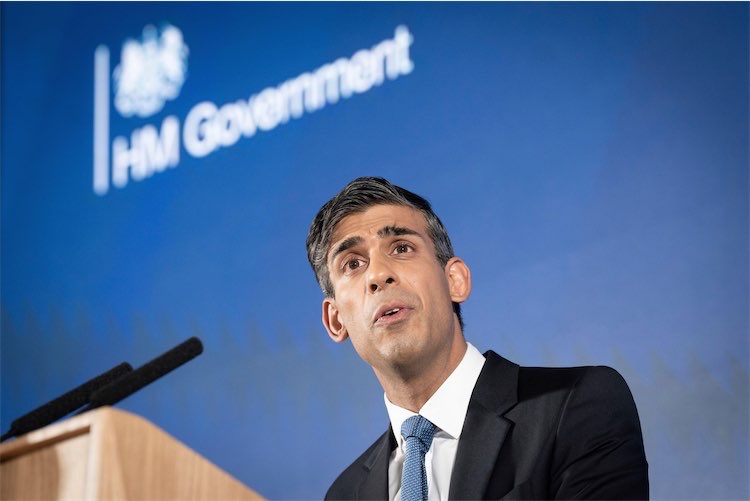 Rishi Sunak outlined his pledges at the start of the year (Alamy)
Rishi Sunak outlined his pledges at the start of the year (Alamy)
4 January – Prime Minister Rishi Sunak gave a speech outlining the government’s five pledges for the year, which were to then set much of the narrative for political discourse in 2023: Halve inflation, grow the economy, reduce debt, cut waiting lists, and stop the boats. So far he has met only one: inflation.
11 January – Andrew Bridgen, the MP for North West Leicestershire, posted a tweet comparing Covid-19 vaccines to The Holocaust. He then had the Conservative Party whip removed for spreading misinformation. In April he was expelled from the party permanently and later joined the Reclaim Party, becoming their first and only MP, but has since resigned from the party.
16 January – The UK government announced it would block the Gender Recognition Reform (Scotland) Bill due to concerns about how it would affect UK-wide equality law. The Scottish government then tried to challenge this with a judicial review, but it was rejected by the judge.
29 January – Nadhim Zahawi was sacked as Chair of the Conservative Party after an inquiry found he had committed a "serious breach of the ministerial code" over his tax affairs.
FEBRUARY
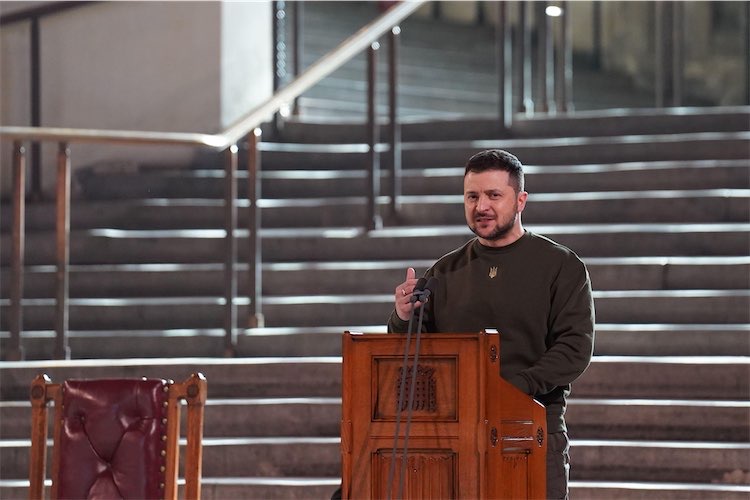 Ukrainian President Volodymyr Zelensky visited UK Parliament (Alamy)
Ukrainian President Volodymyr Zelensky visited UK Parliament (Alamy)
8 February – Ukrainian President Volodymyr Zelensky visited the UK for the first time since Russia’s full-scale invasion of Ukraine, addressing parliamentarians in Westminster Hall and then visiting King Charles in Buckingham Palace.
9 February – Labour held onto West Lancashire in a by-election, increasing their vote share by 10.3 per cent.
15 February – Nicola Sturgeon announced her resignation as First Minister of Scotland, saying she would stand down when a replacement was found.
26 February – Former MP Luciana Berger said she would rejoin the Labour Party after accepting an apology from Keir Starmer, who said there had been a "litany of failures" when it came to the party’s past approach to tackling anti-semitism.
27 February – Sunak announced a new Brexit deal for Northern Ireland, the Windsor Framework, which would introduce a new system of checks on goods moving from Great Britain to Northern Ireland.
MARCH
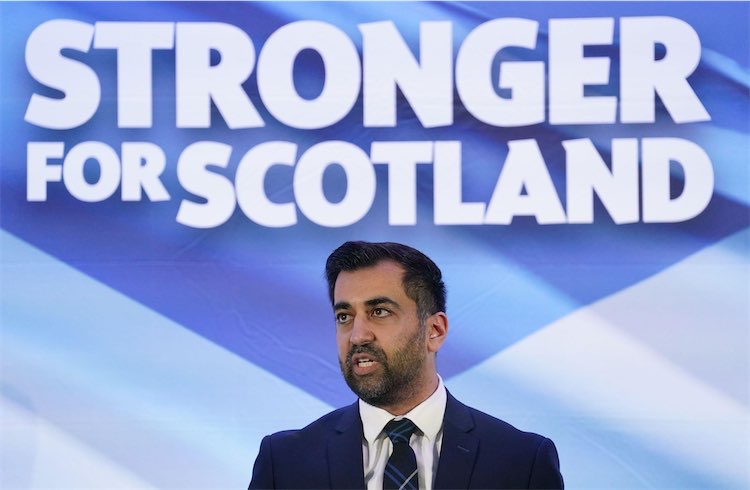 Humza Yousaf became the new First Minister of Scotland (Alamy)
Humza Yousaf became the new First Minister of Scotland (Alamy)
1 March – The Daily Telegraph began to publish a series of tens of thousands of leaked WhatsApp messages which suggested former Health Secretary Matt Hancock rejected advice from scientific advisers to test all residents going into English care homes for Covid.
2 March – Labour leader Keir Starmer announced that then-civil servant Sue Gray, who led the Partygate scandal investigation, would be Labour's new Chief of Staff, sparking a row about her impartiality.
15 March – Chancellor of the Exchequer Jeremy Hunt presented the 2023 Spring Budget, which included an extension to younger children of the 30-hours a week of free childcare for families.
16 March – The UK and Wales governments announced a ban on TikTok on government devices, citing security concerns about Chinese-owned app. UK Parliament and the Scottish government then also implemented bans later in March.
22 March – Boris Johnson gave evidence to the cross-party Privileges Committee and claimed that he "did not lie" to the House of Commons about his conduct during Partygate. He published a 52-page defence of his actions.
27 March – Humza Yousaf took over from Nicola Sturgeon as Leader of the SNP and First Minister of Scotland.
APRIL
6 April – Labour released an advert which claimed Sunak did not believe people convicted of child sex offences should be sent to prison, leading to accusations that they were conducting "dog whistle" and "gutter politics".
21 April – An inquiry found that Deputy Prime Minister and Justice Secretary Dominic Raab had bullied civil servants in his department, causing him to resign from Government. He was succeeded as Deputy Prime Minister by Oliver Dowden and as Secretary of State for Justice by Alex Chalk.
23 April – Diane Abbott was suspended from the Labour Party after writing a letter in The Observer in which she argued Irish people, Jews, and Travellers did not experience racism in the same way Black people do.
28 April – Richard Sharp resigned as Chairman of the BBC after it was found he had failed to declare his connection to a £800,000 loan secured by Johnson.
MAY
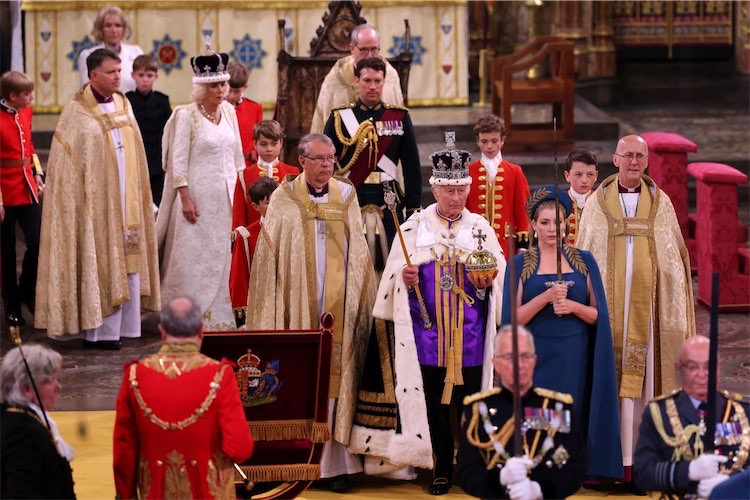 King Charles III was crowned in May (Alamy)
King Charles III was crowned in May (Alamy)
4 May – The Conservatives suffered significant losses in the local elections, with Labour and the Lib Dems gaining control of a number of previously Tory councils and the Green Party making record gains.
6 May – King Charles III and Queen Camilla were crowned in the first coronation ceremony in nearly 70 years. Leader of the House of Commons and Lord President of the Privy Council Penny Mordaunt attracted much admiration for carrying the Sword of State as part of the ceremony.
JUNE
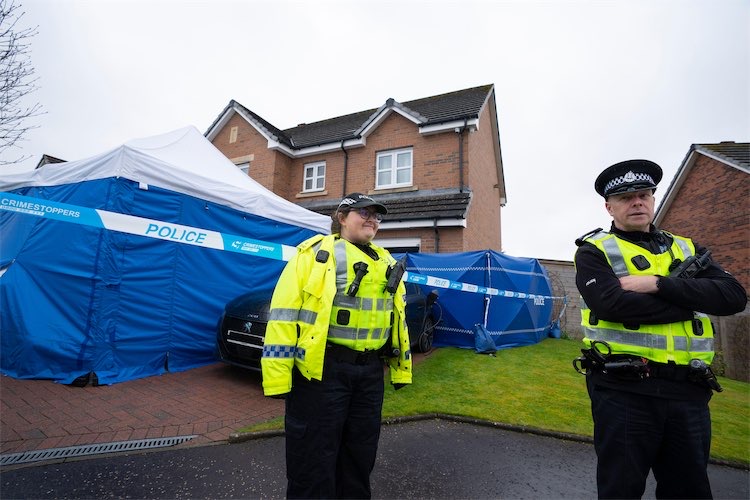 Police had searched Nicola Sturgeon and her husband's house in April (Alamy)
Police had searched Nicola Sturgeon and her husband's house in April (Alamy)
9 June – Johnson announced he would stand down as an MP with immediate effect, triggering a by-election. He published his controversial Resignation Honours which included knighthoods for Jacob Rees-Mogg and Simon Clarke, and a damehood for Priti Patel.
Johnson loyalist Nadine Dorries also announced she will stand down as Conservative MP for Mid Bedfordshire, but there was a delay in triggering a by-election in the constituency after she took more than two months to submit her formal resignation.
11 June – Sturgeon was arrested as part of an ongoing investigation into the SNP's finances, before being released without charge.
27 June – Hancock gave evidence to Covid Inquiry for the first time, in which he said the UK's pandemic planning was "completely wrong" and he was "profoundly sorry". He went on to give further evidence in November.
28 June – The final proposals for new constituency boundaries were published, overall increasing the number of seats in England at the next general election and decreasing the seats in Scotland and Wales.
29 June – The government’s Rwanda Asylum Plan was ruled unlawful in the Court of Appeal.
JULY
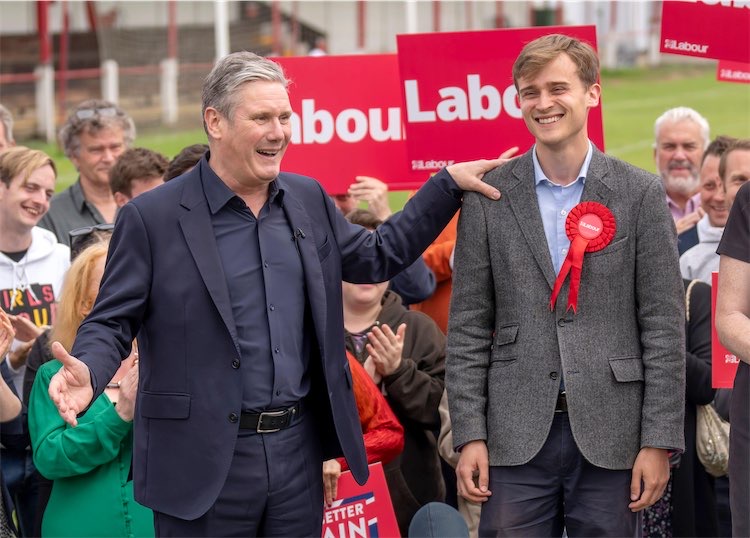 Keir Mather became the youngest MP in Parliament upon winning the Selby and Ainsty by-election (Alamy)
Keir Mather became the youngest MP in Parliament upon winning the Selby and Ainsty by-election (Alamy)
5 July – Six members of Parliamentary staff said that a "predatory culture" still exists in Westminster, in interviews with BBC Newsnight. The next day Chair of the Women and Equalities Committee Caroline Nokes said she had experienced inappropriate behaviour at Westminster around 30 times since becoming an MP.
20 July – A mixed picture emerged from three parliamentary by-elections held in Somerton and Frome, Uxbridge and South Ruislip, and Selby and Ainsty. The Tories retained Uxbridge with a reduced majority, Labour won the former Tory safe seat of Selby, and the Lib Dems won Somerton from the Tories.
AUGUST
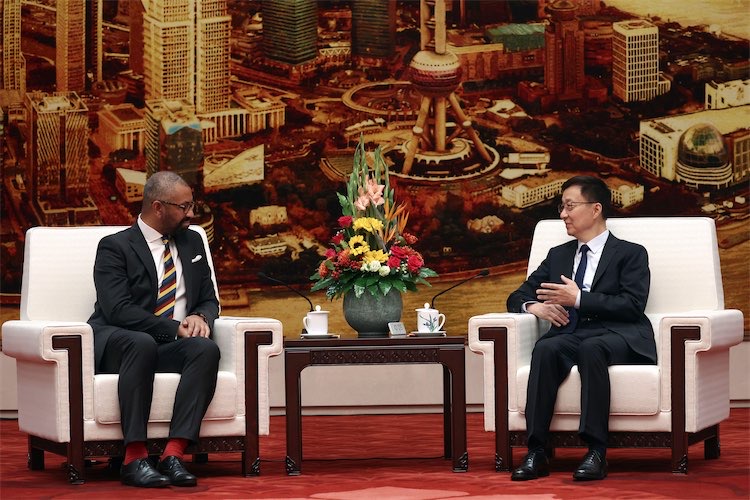 Foreign Secretary James Cleverly visited China (Alamy)
Foreign Secretary James Cleverly visited China (Alamy)
30 August – Foreign Secretary James Cleverly met China's Vice President Han Zheng in Beijing, the first visit to China by a UK foreign secretary in more than five years.
SEPTEMBER
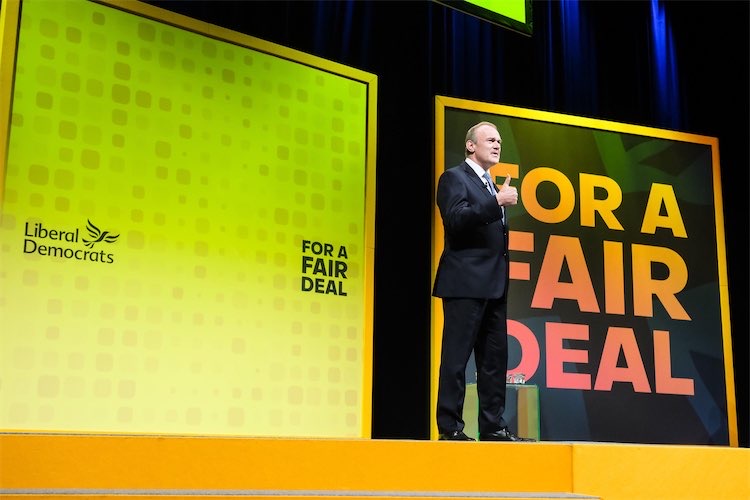 Liberal Democrat leader Ed Davey gave his keynote speech at the end of party conference (Alamy)
Liberal Democrat leader Ed Davey gave his keynote speech at the end of party conference (Alamy)
3 September – The government announced that some schools would not yet reopen for the new term, as defective concrete could have made around 214 school buildings unsafe. The next day, Education Secretary Gillian Keegan was recorded during an ITV interview asking why nobody told she was doing a “fucking good job” over the crisis.
10 September – The Sunday Times reported that two men, including a researcher working in UK Parliament, had been arrested under suspicion of spying for China.
20 September – Sunak announced a delay in banning the sale of new petrol and diesel cars from 2030 to 2035, as well as pushing back a ban on gas boilers in all new homes from 2025 to 2035. The move angered some of his own backbenchers who saw it as rowing back on pledges to achieve net zero.
23 - 26 September – The Liberal Democrats held their party conference in Bournemouth. Members voted to reject proposals by the party leadership to abandon their housebuilding target of 380,000 properties per year.
OCTOBER
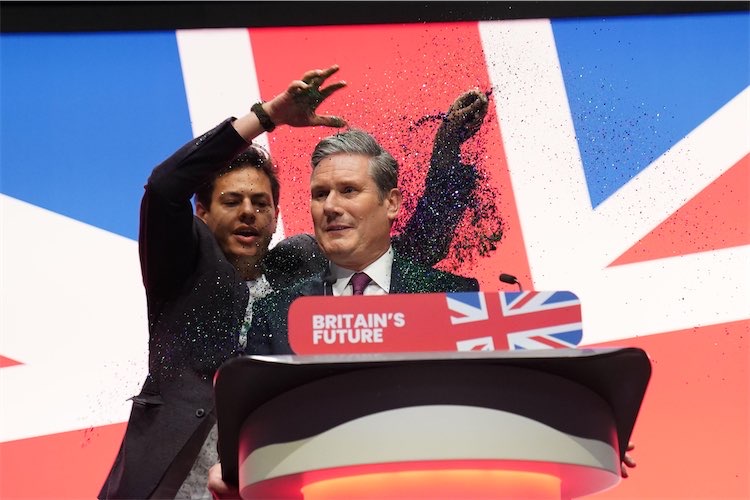 A protester interrupted Keir Starmer's speech at conference (Alamy)
A protester interrupted Keir Starmer's speech at conference (Alamy)
1 - 4 October – The Conservatives held their party conference in Manchester. Home Secretary Suella Braverman gave a speech on the third day, which saw Conservative London Assembly member Andrew Boff escorted out by security for heckling her and accusing her of talking “trash” about “gender ideology”.
On the fourth day, Sunak confirmed that the West Midlands to Manchester leg of the HS2 rail project would be axed, met with widespread condemnation. The Prime Minister also announced a year-by-year increase of the age at which people can buy cigarettes and tobacco, and confirmed plans to replace A Levels and T Levels in England with a new qualification called the Advanced British Standard.
5 October – Labour candidate Michael Shanks won the Rutherglen and Hamilton West by-election from the SNP.
7 October – Terror group Hamas, which controls Gaza, launched a vicious surprise attack on Israel, resulting in the deaths of more than 1,200 Israelis and the kidnapping of 138 hostages. The attack provoked a retaliation by Israel which then launched an air, ground and sea campaign to eliminate Hamas, so far killing tens of thousands of Palestinians. The day after the 7 October attacks, Sunak chaired an emergency COBRA meeting in the UK.
8 - 11 October – Labour hosted its party conference in Liverpool. Keir Starmer delivered his keynote speech on the third day, promising to build 1.5m new homes and make reforms to the NHS and education, but was interrupted at the start by a protester from a group called People Demand Democracy, who threw glitter over Starmer’s head.
19 October – Labour won two more by-elections in Mid Bedfordshire and Tamworth, both previously held by the Conservatives.
25 October – The Financial Times revealed that Shadow Chancellor Rachel Reeves had lifted sections of her new book, The Women Who Made Modern Economics, from Wikipedia, the Guardian reported.
NOVEMBER
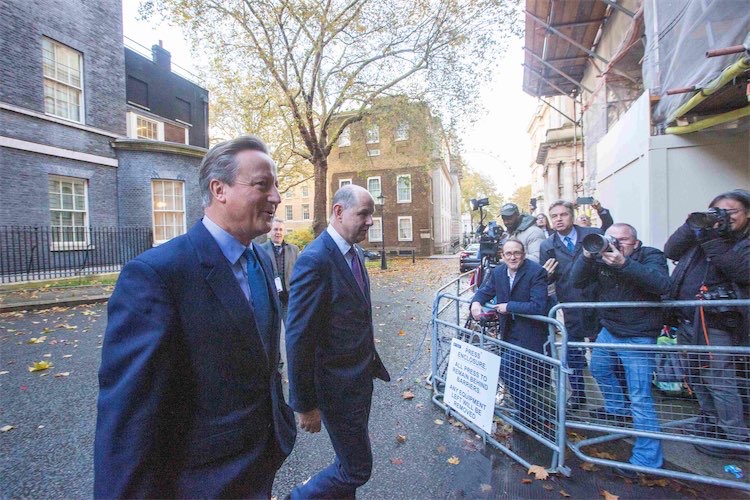 David Cameron made a surprise return to government (Alamy)
David Cameron made a surprise return to government (Alamy)
1 - 2 November – The UK hosted the world’s first AI Safety Summit at Bletchley Park. On the final day, Sunak interviewed billionaire Elon Musk about the risks and opportunities presented by AI.
9 November – Dorries published her book, The Plot, detailing how she believed Johnson had been brought down by “powerful forces” in UK politics.
13 November – Suella Braverman was sacked as Home Secretary, triggering a cabinet reshuffle which saw her replaced by James Cleverly.
In a surprise move, former prime minister David Cameron made a return to government to be appointed as Foreign Secretary and a life peer in the House of Lords.
15 November – The British Government's plan to deport migrants to Rwanda was ruled unlawful by the Supreme Court. Sunak announced that "emergency legislation" would be brought in to "confirm Rwanda is safe" and prevent further legal challenges.
15 November – Labour frontbenchers resigned to vote for an SNP motion calling for a ceasefire in Gaza. The SNP's amendment was rejected with MPs voting 293–125.
22 November – Jeremy Hunt delivered the Autumn Statement, which included cutting some National Insurance rates and making the “full expensing” of capital allowance permanent, allowing companies to deduct spending on new machinery and equipment from profits.
27 November – A diplomatic row broke out between the UK and Greece over the Elgin Marbles, with Sunak cancelling a meeting with the Greek prime minister after Kyriakos Mitsotakis broke an agreement not to discuss the Marbles in public.
A few days later King Charles wore a tie to COP28 which had a pattern of the Greek flag, prompting speculation over whether he was making a political point.
DECEMBER
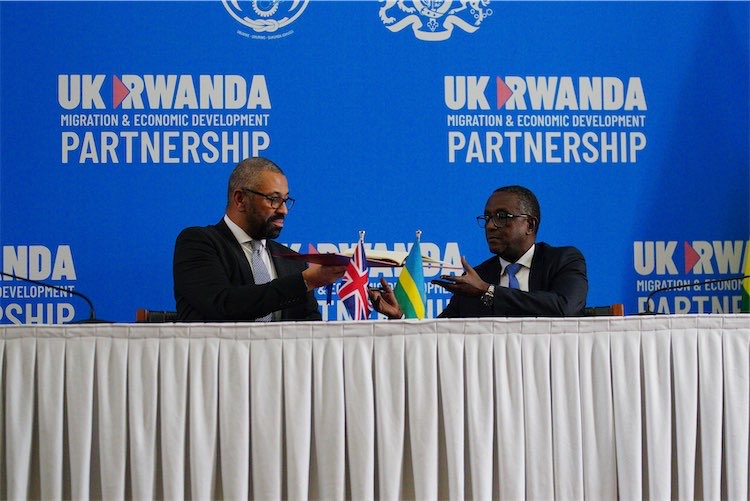 Home Secretary James Cleverly signed a new treaty with Rwanda (Alamy)
Home Secretary James Cleverly signed a new treaty with Rwanda (Alamy)
5 December – Home Secretary James Cleverly signed a new treaty with Rwanda which he said would address the concerns of the Supreme Court over the scheme.
6 December – Robert Jenrick resigned as Immigration Minister, arguing the emergency Rwanda legislation "does not go far enough".
6 - 7 December – Johnson gave evidence to the Covid Inquiry and admitted he and his government should have "twigged" the seriousness posed by the virus earlier than they did in 2020.
11 December – Rishi Sunak gave evidence to the Covid Inquiry and insisted that 'Eat Out To Help Out' had been the right thing to do at the time.
12 December – The UK government avoided a major defeat as MPs voted 313–269 in favour of the revised Rwanda Bill, after the Prime Minister hosted last-ditch talks with a number of Conservative splinter groups.
